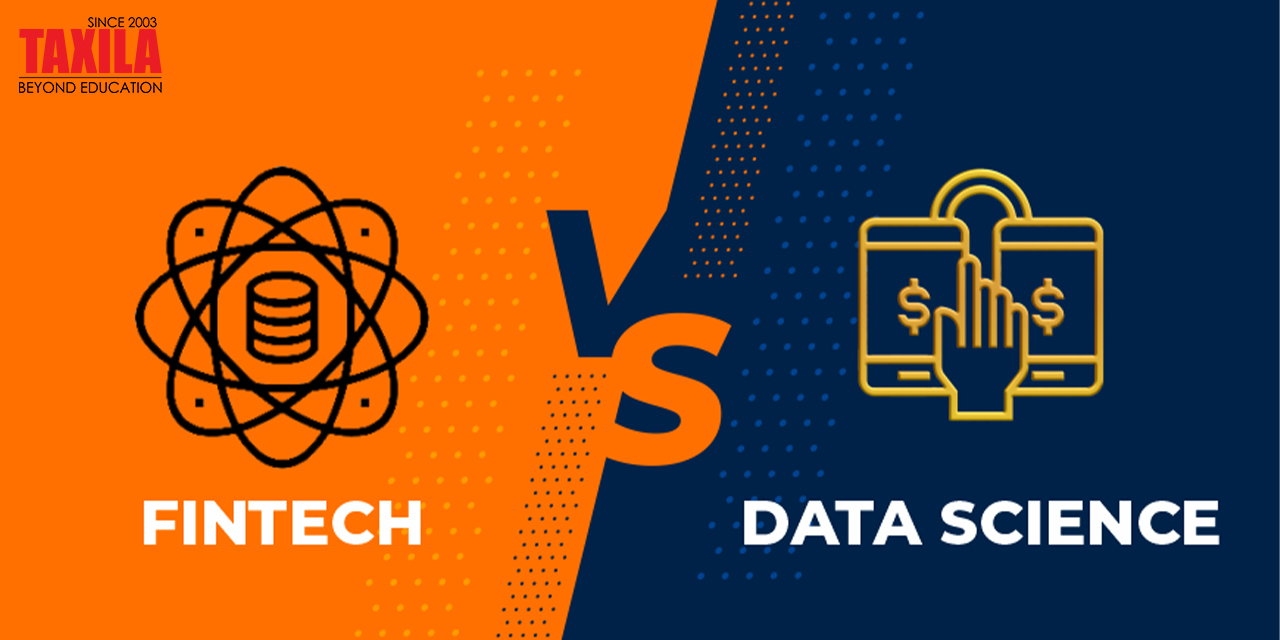
FinTech vs. Data Science – Comparison of Two Fast-Growing Industries
In today’s digital age, data is king. Thus Fintech and Data Science are rising as a dynamic duo. Together, are reshaping the future of businesses and unlocking untapped career opportunities for professionals to make a difference in technology-driven industries. While both industries are increasingly relying on data science to improve their products and services but they differ in their focus and skill requirements.
So, which is better to study FinTech and Data Science?
That’s a great question, and there’s no easy answer. Both fields are growing rapidly and offer exciting career opportunities.
Here’s a closer look at each field to help you decide which one is right to study FinTech or Data Science. Aspiring professionals can choose the path that best fits their interests and professional objectives by being aware of the differences between them.
What is FinTech (Finance Technology)?
FinTech is a combination of “financial technology.” It refers to the use of technology to improve and automate financial services. FinTech companies use data science to develop new products and services, such as robo-advisors, fraud detection systems, digital finance, and digital lending platforms. It encompasses various areas such as mobile payments, digital banking, blockchain technology, and automated wealth management. Here are some key aspects of FinTech to consider:
- Industry Focus: FinTech experts work at the intersection of finance and technology, leveraging technological innovations to improve financial processes, customer experiences, and financial inclusion.
- Skill Requirements: Success in FinTech depends on having a solid understanding of financial concepts, regulatory knowledge, and cutting-edge technologies like blockchain and artificial intelligence.
- Career Prospects: FinTech offers a wide range of career opportunities, including roles in product development, data analytics, cybersecurity, risk management, Finance marketing, and entrepreneurship.
If you’re interested in a career in FinTech, you’ll need to have strong analytical and problem-solving skills. You’ll also need to be comfortable working with data and using statistical software.
What is Data Science?
Data science is the field of study that deals with the collection, analysis, and interpretation of data. It uses a variety of methods, including statistics, machine learning, and artificial intelligence, to extract insights from data.
Here’s what you need to know about data science:
- Analytical Expertise: Data analysts use their knowledge in statistics, programming, and machine learning to analyze data, spot trends, and come to data-driven conclusions.
- Versatility and Applications: Numerous sectors, including finance, healthcare, e-commerce, and marketing, use data science. Data scientists provide insights and solutions to complicated challenges in order to improve business operations and results.
- Skill Requirements: For a successful career in data science programming languages (such as Python or R), statistical analysis, machine learning methods, and data manipulation tools are required.
- Career Prospects: Data scientists have a wide range of career options, including positions as research scientists, data analysts, data engineers, and machine learning engineers.
Considering the following points you can take your decisions if you want to pursue a career in data science. As it requires strong math and programming skills. You’ll also need to be able to think critically and creatively.
FinTech or Data Science Which Field is Better?
The answer to this question really depends on your individual interests and skills. If you’re interested in the financial services industry and want to use data science to improve financial services, then FinTech may be a good fit for you. Moreover, it gives you access to a wide range of job opportunities, including data science aside from finance.
If you’re interested in the field of data analysis and want to work in a variety of industries, then data science may be a better fit.
Ultimately, the best way to decide which field is right for you is to explore both of them and see which one you’re more passionate about.
Secure your Future in Finance with Taxila Business School
If Are you looking to secure a promising future in finance with PGDM in FinTech? Look no further than Taxila Business School can assist you in developing the information and abilities that you need to succeed in the quickly expanding financial technology sector. With the rapid advancements in technology reshaping the finance industry, Taxila offers the perfect blend of PGDM in finance and technology programs to analyze the financial markets using theoretical concepts of finance and economics.
Here are some of the benefits of studying PGDM in FinTech from Taxila Business School:
- Estimate the role of Blockchain, Sandboxes, and the impact of Artificial Intelligence on delivery.
- Analyse financial securities and portfolios and assess their risk and return
- Analyze the requirement for data analytics as a risk management tool.
- Learn about the complexities of Cryptocurrency valuation and the challenges they face.
- Investigate the potential of FinTech SaaS (Software as a Service).
- Status and future growth of Insure Tech, Investment Tech, Wealth Tech, Lending Tech, and Reg Tech.
- Analyze the emergence of Neo Banking in India
With this program, you can gain in-depth knowledge of cutting-edge fintech concepts, explore industry collaborations, and engage in hands-on learning experiences. Take the leap and secure your future in finance with Taxila Business School’s PGDM in Fintech.
Wrapping Up
FinTech and Data Science are two fast-growing industries with distinct yet interconnected roles in the digital age. FinTech combines finance and technology to revolutionize financial services, while Data Science leverages data analysis to extract insights and drive informed decision-making. The choice between the two depends on individual preferences and career goals. Both fields present promising career prospects, emphasizing the importance of carefully evaluating interests and strengths to make informed decisions and contribute to the dynamic landscape of the digital era.
You May Also Like To Read:
Top 100 MBA Colleges in India
Explore the complete list of the top 100 B-Schools in India offering MBA/PGDM.
